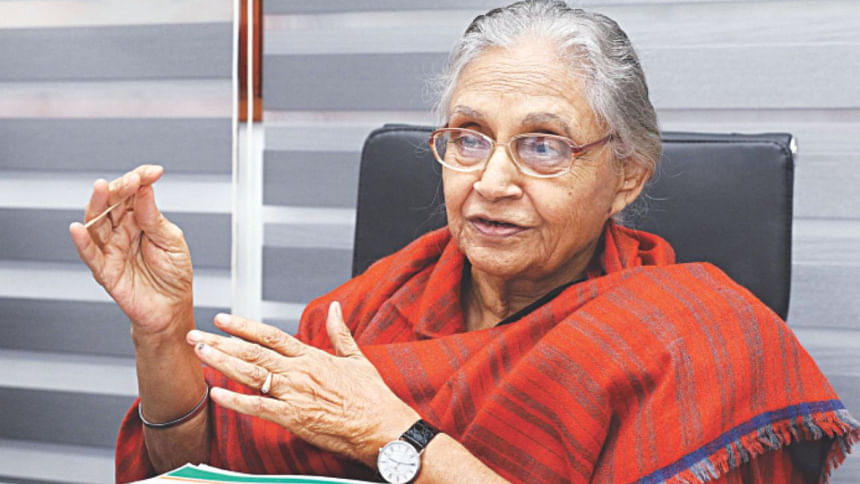Stern city governance, lot more power for it

Stern governance and empowered elected local bodies should help alleviate Dhaka city's current messiness and the stigma of poor liveability, said former Delhi chief minister Sheila Dikshit in an interview with The Daily Star.
“Just tighten up the governance system and fix the responsibilities of all concerned,” said Dikshit, who earned the image of a tough administrator while ruling the Indian capital for 15 years at a stretch.
“Either you change the present state of city governance or you empower the two Dhaka municipalities [city corporations] with much more power; give them more power and funds to enable them to deliver the public services,” she said in the interview on Wednesday in Dhaka.
“There must be a common authority on Dhaka city development instead of multiplicity of authorities that only causes clash and overlapping,” she said, adding, “Good governance is something achieved through corporation among authorities and not by confrontation.”
The central government does not have the time to look into the micro issues of city management, as it has so many other things to take care of, she said on the sidelines of a World Bank-sponsored international conference.
The 79-year-old, who was the chief minister for three consecutive terms between 1998 and 2013, also recommended a set of separate laws, which she termed constitution, for Dhaka city's development and urban management.
Delhi is absolutely a planned city; one cannot build even a room without an approved plan, she said.
Delhi's green spaces are conserved with great care and the Dikshit government introduced Bhagidari (public participation) movement with Delhi dwellers to promote civic participation in local governance.
The stated goal of the movement was to create transparency and accountability in the administration to improve the quality, efficiency and delivery of public services.
In Delhi, the government led by the chief minister is responsible for almost all city development and civic service deliveries.
Any aggrieved citizen goes to the elected chief minister for remedy, not to the lieutenant governor.
They do not know the water supply authority or the home ministry; they file complaints with the Delhi government that takes up the issue with the relevant authority and gets it solved.
“So we are like a link between the public offices and the people,” said Dikshit, who was known to have unyielding influence as the Congress Party supported administrator in Delhi.
She spearheaded enhanced power generation with privatisation to give Delhi dwellers uninterrupted electricity, controlled air pollution with CNG conversion of public transport vehicles, constructed Delhi metro rail, set up new hospitals, schools and universities, and built 78 flyovers to ease the public transportation system.
Public transport services like metro rail, bus and taxi services were all taken care of by the Delhi government. As to building 250km of metro rail lines, she said they just demanded it from the central government arguing otherwise Delhi would collapse.
And they started building it.
Delhi changed a lot during her 15-year tenure. Be it education, transport, pollution control, greening of Delhi, building more hospitals, founding more schools and universities.
“We took a holistic approach to touch upon every aspect of civic life,” she said, adding, “A person living in poor colony would be as happy as the one living in affluent colony.”
For instance, during winter, which is severe in Delhi, the Dikshit government would build small tents for the poor so that they do not have to sleep under the open sky.
It got girl children to go to school and introduced a stipend programme in which the girls would get Rs 1 lakh if they studied up to class-12.
She said such public service action makes a big difference in society. They interact with the people to provide them with the services they require.
As to how the urban poor were supported in Delhi city, she said the government provides housing for them and they get ownership of it after a period and they get electricity and water at a cheaper rate.
“We have to act within whatever powers we have and all our actions have to be rectified by the home ministry and urban development ministry and by the lieutenant governor also,” said Dikshit, adding, “We just manage doing everything by being cooperative to each other.”
Dikshit enjoyed the support of a Congress-led UPA government at the centre for nine of the 15 years as Delhi chief minister but had to negotiate with the opposition BJP-led central government for the other six years.
In the December 2013 elections to the Delhi Legislative Assembly, Dikshit was defeated in New Delhi constituency by Aam Aadmi Party leader Arvind Kejriwal.

 For all latest news, follow The Daily Star's Google News channel.
For all latest news, follow The Daily Star's Google News channel. 



Comments